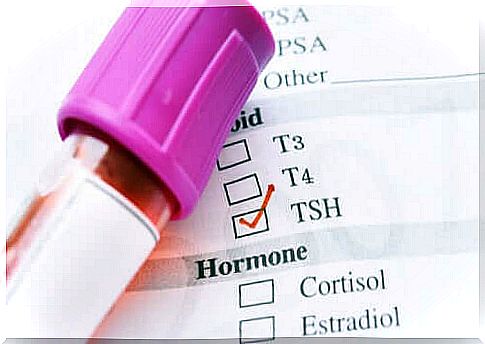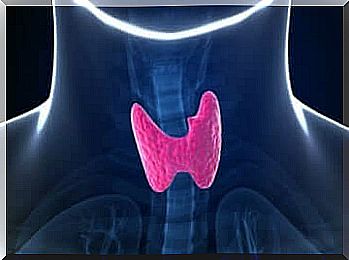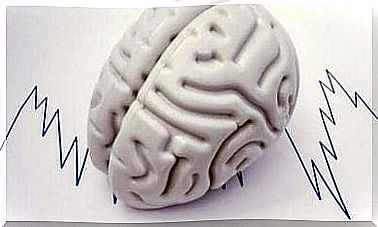Low TSH: What Are The Causes?
TSH is the hormone responsible for regulating the production of thyroid hormones. Its imbalance manifests itself in problems of hypothyroidism and hyperthyroidism.

TSH, or thyroid stimulating hormone, is a molecule that is involved in possible dysfunctions of the gland. Therefore, when we have certain symptoms related to this organ, the doctor will require an examination to measure the levels of TSH in the blood. Low TSH is a sign of an alteration that needs to be investigated further. Often, this exam is the first of several to follow.
What is TSH?
TSH is also called thyroid stimulating hormone , or technically thyrotropin . It is released by the pituitary after being stimulated by the hypothalamus through another hormone known as the thyrotropin releaser or TRH.
Once TSH is in the blood, it comes into contact with the cells of the thyroid gland to produce two other hormones:
- T3 or triiodothyronine: it is much more active than T4 and it is this which exerts the effects on the tissues. In other words, it regulates their metabolism
- T4 or thyroxine: it has minimal activity on the tissues. Rather, it is a reservoir of T3, because when T4 reaches the tissues, it can turn into T3, which is the one that exerts the final action
T3 and T4 go into the tissues to control the metabolism of proteins, carbohydrates and fats. In addition, in babies, these hormones are very important because they contribute to the normal development of the brain tissue of the newborn.

What are the causes of low TSH?
According to a study published in 2017, which involved around 4,554 people between the ages of 18 and 93, the prevalence of hypothyroidism in the Spanish population was 9.1%. In addition, the prevalence of hyperthyroidism was 0.8%.
Together, these two disorders would therefore affect almost 10% of the population. In all of these patients, it would then be possible to find an abnormal TSH result. The hormone in question is regulated in three ways:
- The amount of TRH that releases the hypothalamus
- The pituitary itself; who is responsible for storing and releasing TSH if necessary
- Negative feedback from thyroid hormones
What is negative feedback?
When many thyroid hormones are produced, they are logically found in greater quantities in the blood. The hypothalamus and pituitary gland detect this rise and reduce their production of TRH and TSH. This is called negative feedback.
In other words, the hormones themselves regulate themselves in order to have stable levels in the blood which are not too high. If this mechanism did not exist, we would be constantly hyperthyroidism or hypothyroidism.
TSH levels in the blood
Normal TSH levels in the blood are between 0.4 and 4 mIU / L. If they are higher or lower than these values, it means that there is a dysfunction of the thyroid.
More concretely, a low TSH means that there is so much T3 and T4 in the blood that they react negatively to the pituitary gland, preventing production. Usually, this scenario involves hyperthyroidism.
There is also low TSH due to secondary hypothyroidism. It happens when there is a dysfunction of the pituitary gland. Either because part of this gland is destroyed or because something is preventing it from functioning properly, such as a brain tumor.
Finally, tertiary hypothyroidism can also be responsible. In other words, the hypothalamus does not work and stops producing TRH. Therefore, it does not transmit signals to the pituitary gland to produce TSH.
In the first case, when there is an overproduction of peripheral thyroid hormones, we find very high T3 and T4 levels in the blood, indicating then overmetabolism. The body will begin to burn all the fats and sugars in the body for energy.
Treatment of TSH imbalances
Hyperthyroidism
Symptoms of hyperthyroidism are nervousness, palpitations, hyperactivity and increased sweating. There is also hypersensitivity to heat, increased appetite and weight loss.
If you think you have hyperthyroidism, see a doctor. He will do blood tests for TSH, T3 and T4. In case the TSH level is low and the thyroid hormone levels are high, the diagnosis of hyperthyroidism will be confirmed.
The causes can range from a thyroid tumor to an autoimmune disease in which the antibodies created overexcite the thyroid cells. There are drugs that reduce and control the symptoms.

Also read: Hyperthyroidism: 5 Keys to a Healthy and Full Breakfast
Hypothyroidism
Symptoms contrary to the previous ones, such as fatigue, weight gain, cold intolerance and hypothermia, are indicators of hypothyroidism. This may be due to a brain tumor destroying the pituitary gland, or compressing it, preventing it from releasing TSH. It can also be a low production of T3 and T4 in the gland itself.
Finally, low TSH against the background of hypothyroidism reveals a more serious problem, related to the destruction of the pituitary gland. On the other hand, if the TSH is normal or high, the suspicion is on the thyroid gland.









